Anyone who wants to travel to Ireland has many questions. Most people do, anyway.
Some questions come up again and again. This is certainly the case with our clients.
Page Contents (click line to jump the text)

Intro
This article will deal with these typical questions – and the answers to them. Read on – and I can probably answer many of your own questions.
We come from Germany and have lived (second home) in Ireland for several years and travelled the island many times.
Disclaimer: All information is without guarantee, especially about the entry requirements you should inform yourself before starting your journey.
So let’s get started:
Entering Ireland
What documents do I need to enter Ireland?
Ireland is in the EU but not in the Schengen Agreement. Travellers from non-EU countries need a passport to enter Ireland. For German travellers an identity card is sufficient and for travellers from other countries a corresponding official ID or passport.
A passport is required in any case for entry into Northern Ireland. An identity card is not officially sufficient.
How long are tourists allowed to stay in Ireland?
As a non-EU citizen, you are generally allowed to stay in Ireland for up to three months at a time. EU citizens may stay in Ireland for longer than three months, but may need to apply for a residence permit.
Do I need vaccinations for Ireland?
There are no compulsory vaccinations for Ireland.
How many cigarettes can I bring to Ireland?
The allowance is 250g of tobacco, or 200 cigarettes, or 50 cigars or 100 cigarillos.
What can I not bring into Ireland?
Products of animal origin (meat, fish, dairy products) may be brought from EU countries, provided they are permitted in the EU and labelled accordingly. For non-EU countries, this is not allowed, except for very small quantities for personal consumption (travel provisions).
How much alcohol can I bring into Ireland?
The allowances for travellers from the EU are one litre of spirits or 4 litres of wine. In addition, VAT and/or customs duties may be payable.
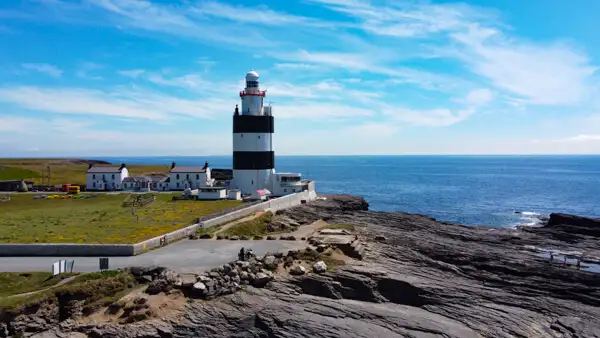
How much whiskey can be exported from Ireland?
The same allowances apply as for entry.
Can I take my dog to Ireland?
Yes, you can by car and ferry. The ferries from France to Ireland are within the EU.
Travelling via the UK means leaving the EU. In that case an additional declaration has to be presented to the British customs that the dog is in transit and will not be sold in the UK.
What are the entry requirements for dogs in Ireland?
Valid pet passport with proof of full rabies vaccination at least 21 days prior to travel. Also microchip with entry in pet passport. Other useful vaccinations should be discussed with your vet.
Can I fly to Ireland with my dog?
No, unfortunately this is not possible at the moment. It is not mentioned anywhere on the websites of the airlines, but if you try to book a flight for your dog to Ireland, you will always run into error messages. We are dog owners and have checked with the airline and supposedly there is an old English regulation that says it is not possible (because the flights go via England…???).
General Information
Is Ireland expensive?
The cost of living and travel in Ireland is at a comparable level to many north-western European countries and is roughly comparable to Germany. Ireland is not a destination for “cheap travel”.
How much money do you need in Ireland?
This varies greatly from person to person. For an overnight stay in a B&B in a double room with breakfast you can expect about 80-120 euros per night. A dinner in a pub with a drink costs about 15-25 euros and for a sandwich and a coffee at lunch you can calculate about 10 euros. Entrance fees to sights range from €5 to €20. Dublin is an expensive city, so you can probably add 25%-30%.
What languages are spoken in Ireland?
There are two official languages, English and Gaelic (Irish). Both are taught in school and used in daily life, at least to some extent. Gaelic (Irish) is still partly spoken as a living language in the so-called Gaeltacht regions in the west and north-west of Ireland, but not in the east.
What souvenirs can you typically buy in Ireland?
Popular souvenirs include items made of wool, such as Aran jumpers, items with Irish symbols, such as the tree of life, Irish knots, the shamrock (cloverleaf) or Celtic crosses, Guinness fan articles, whiskey, sweets such as shortbread or fudge, or Celtic jewellery.
How many people live in Dublin?
Hard to say, because there is no compulsory registration in Ireland. Dublin itself probably has around 600,000 inhabitants, if you add the region (county) of Dublin, there are probably 1.7 million inhabitants and if you include the catchment area of commuters, there are probably 2 million people.
What is the currency in Ireland?
Ireland is in the EU and uses the euro as its currency.
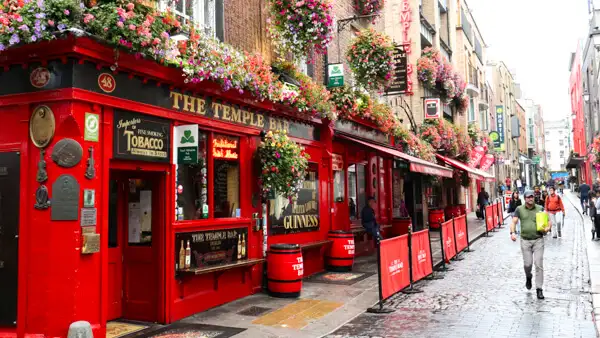
What currency is used in Northern Ireland?
Northern Ireland is part of the UK and uses the pound as its currency.
Is Ireland in the EU?
Yes, Ireland has been in the EU since 1973.
Is Northern Ireland in the EU?
Northern Ireland is part of the UK and left the EU with Brexit.
How much cash can you bring to Ireland?
As a rule, you have to declare cash holdings over 10 thousand euros before entering the country.
Is Ireland a safe country to travel to?
Statistically, Ireland is one of the safest countries in Europe to travel to. I can only confirm this personally. Nevertheless, there can be pickpockets from time to time, especially in big cities and tourist hotspots. Therefore, you should always carry your valuables safely stowed away and close to your body and not leave any valuables behind in a parked vehicle.
What kind of sockets does Ireland have?
Ireland has the English plug sockets with three poles. The travel adapter for England also fits in Ireland and Northern Ireland.
What kind of electricity grid does Ireland have?
Ireland and Northern Ireland both have 230V.
How to travel from Ireland to Northern Ireland?
Ireland and Northern Ireland have a green border with no border controls. However, you must carry your passport.
How can I pay in Ireland?
All major credit and debit cards generally work in Ireland. However, you should have some cash with you, as not every B&B or shop accepts cards. Cash (Euro) works everywhere.
How many people live in Ireland?
The population in Ireland is trendy-sag growing and is currently just over 5 million.
How many visitors come to Ireland every year?
About 11 million tourists come to Ireland every year, about twice as many as residents.
How many sheep live in Ireland?
When you travel around the country, this question really comes to mind because you see them everywhere. There are about 8 million sheep in Ireland, which is significantly more than the population.
Are the Irish hospitable?
The Irish are generally considered friendly, helpful and hospitable. Landlords can only confirm this from their own experience.
Traffic
What are the speed limits in Ireland?
The speed limits in Ireland are: 50kmh in built-up areas, 80kmh on regional roads, 100kmh on national roads and 120kmh on motorways.
What are the speed limits in Northern Ireland?
The following speed limits in miles per hour apply in Northern Ireland: 30mph (approx. 47kmh) in built-up areas, 60mph (approx. 95kmh) outside built-up areas and 70mph (approx. 113kmh) on highways.
Is it left-hand traffic in Ireland?
No. All over the island of Ireland you drive on the left hand side of the road.
Are there speed controls in Ireland?
As far as we know there are no stationary speed cameras (like in Germany), but there are mobile speed cameras.
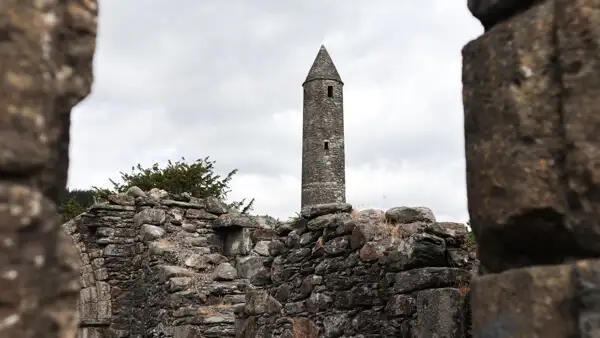
What is the name of the police in Ireland?
The police you will see on holiday are the Garda. Garda’s are uniformed and travel in conspicuously marked vehicles. In the event of an accident they will come to the scene.
What is the emergency number in Ireland?
The emergency number in Ireland is 112 and in Northern Ireland 999.
Are there many petrol stations in Ireland?
Yes, the petrol station network is well developed and you will have no problem finding a petrol station on the road.
Can I travel in Ireland with an electric car?
Yes, this is not a problem. You will see many electric cars on the roads in Ireland and the network of charging stations is now well developed.
Can I travel by public transport in Ireland?
There are only a few train connections, but long-distance buses travel throughout the country. There are also local bus services. The cities and larger towns are well connected. However, many small towns, rural attractions and landscapes are difficult to reach by bus.
Taxis are available in all larger towns, but usually have to be ordered via app or by phone. Uber is hardly used outside Dublin, where it is taken by taxis.
Places of interest and travel planning
What sights is Ireland known for?
Some of the most famous sights on the island of Ireland are: Cliffs of Moher, Kylemore Abbey, Giants Causeway, Blarney Castle, Rock of Cashel, Newgrange, Christ Church Cathedral, Trinity College, Glendalough and Powerscourt House.
Where is the most beautiful place in Ireland?
The Wild Atlantic Way, i.e. the Irish west coast, is particularly spectacularly beautiful with many high cliffs, several low mountain ranges and many beautiful beaches.
But many other parts of the country also have their beautiful sides and are worth a visit.
How much time should I plan for Dublin?
At least a long weekend and if you are interested in culture, you will not get bored with Dublin in a week.
How much time should I plan for a round trip to Ireland?
This is where most people miscalculate: because of the narrow and often confusing roads, the average speed of travel on the island of Ireland is very slow.
Therefore, despite the short distances, you need about a week for half the west coast and about 14 days for the entire Wild Atlantic Way.
To travel once around the island, you should allow at least two weeks if you skip some corners, but even three weeks is not too much.
What should you see in Ireland?
If you only have a few days, you can combine Dublin with a few trips to the east coast. But if you can spare a little more time, you should definitely go to the Wild Atlantic Way.
And if possible, you can do some sightseeing along the way. Ireland has an incredible number of castles and abbeys and you’re sure to find a few along the way.
How much time should you allow for the Wild Atlantic Way?
The Wild Atlantic Way is approximately 2500km long and runs from Malin Head on the northern tip of the island, along the west coast to Kinsale on the south coast. You should plan at least two weeks for the entire route. If you have less time, you can still do part of the route.
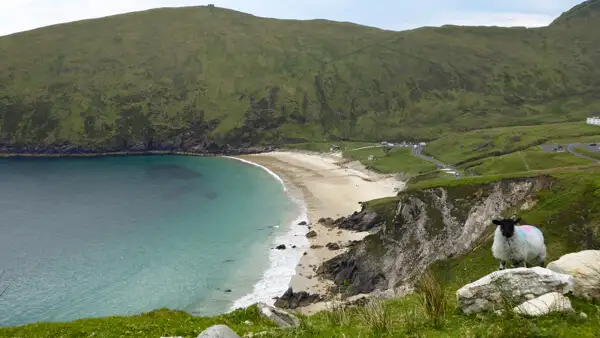
What are the differences between Ireland and Scotland for travel?
Ireland and Scotland are similar in landscape and culture, but the scenic highlights are different: Many travellers go to Ireland mainly for the Wild Atlantic Way (coast) and many go to Scotland for the Highlands.
So it’s definitely worth visiting both Ireland and Scotland!
What cities should you see in Ireland?
If you like cities like Hamburg, you’ll like Dublin. What do I mean by that? A city on the water with a lot of life and also culture.
If you want a more historical cityscape, then I can only recommend Kilkenny. The castle is nice to visit and the historic old town is very nice to stroll around, eat, drink and enjoy.
There are many small towns all over Ireland that are little known but colourful and nice – just discover them on the way!
Where to stay
How can you stay overnight in Ireland – what are the options?
There is a wide range of options: While hotels, guesthouses and B&Bs are the classic options, there are also many campsites, hostels, Airbnb homestays and, increasingly, glamping.
Do I need to book accommodation in Ireland in advance?
Ireland is a popular tourist destination, and especially from the end of June to mid-August, Irish families are also on the move along the coasts. Accommodation can then be scarce and expensive and you should definitely book well in advance.
In spring or autumn, you can book at short notice or take a chance. But especially in the winter months, many B&Bs are closed, so I would book at least one day in advance to avoid stress on the road.
How do you book accommodation in Ireland?
The apps from Booking.com and Airbnb work very well, both are very common all over the island. Our own accommodation is also listed on Airbnb.
Is wild camping allowed in Ireland?
Wild camping is not allowed in Ireland and Northern Ireland. However, there are many campsites, especially on the west coast.
How can I find cheap accommodation in Ireland?
Hotels and B&Bs have become quite expensive in recent years, especially in Dublin. Hostels, camping or Airbnb homestays often offer cheaper accommodation options.
If you travel outside the high season, i.e. before mid-June and after mid-August, and book well in advance, all accommodation is usually much cheaper than at short notice and in the high season.
Food and Drink
Is the tap water in Ireland safe to drink?
The tap water in Ireland is of drinking quality and can be drunk without hesitation. I have been drinking it for years now….
What do the Irish like to eat?
Traditional Irish food is usually hearty and rich. You will often find fish and meat dishes with potatoes and carrot vegetables in all variations on the menus.
The fish usually comes from local waters and the Irish meat is usually excellent because cattle and sheep (lamb) live outside on pastures practically all year round and do not (have to) grow up in stables.
What do the Irish like to drink?
Ireland ranks first in the world in average tea consumption, ahead of England. In addition, the pint (beer) in the evening is not to be missed.
What is traditionally the main food in Ireland?
Traditionally, (almost) no Irish dish is complete without the potato. Often served as chips, mash, boiled potato, jacket potato or fried potato, it accompanies most dishes – in large quantities.
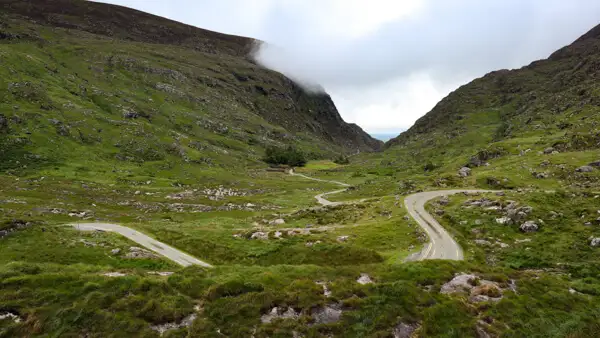
What is a typical Irish breakfast?
Irish breakfast is a big plate of fried egg, fried ham, fried tomatoes, beans, mushrooms, sausages and black and white pudding, which can best be translated as fried slices of black pudding and liverwurst.
Sounds like lunch? It often is: in many places you can order an Irish breakfast for lunch.
How much do you tip in Ireland?
There is no established tipping culture in Ireland. You don’t have to tip, it’s generally not expected, but if you want to tip a few euros, the friendly waitress will be happy to oblige!
Are shops open on Sunday in Ireland?
In Ireland and Northern Ireland you can go grocery shopping everywhere on Sunday. Other shops are closed on Sundays. Shop opening hours are slightly shorter on Sundays – you can usually find the exact opening hours of the respective shops and supermarkets on Google Maps.
When is it legal to buy and consume alcohol in Ireland?
Alcohol can only be purchased from 10:30am during the week and 12:30pm on Sunday. Before this time, the alcohol shelves in supermarkets are locked.
Is there a closing time in pubs in Ireland?
Pubs in Ireland usually close at 11pm during the week, on weekends it can be a little later (earlier).
Climate and weather
When is it warmest in Ireland?
Statistically, the warmest months in Ireland are July and August. Then you can often expect around 23-27 degrees Celsius in Ireland.
What is the best time to visit Ireland?
From May to September, Ireland statistically has the least rainfall and the warmest temperatures. This is the best time to travel for many travellers.
When does it rain most in Ireland?
It can always rain in Ireland, as it does everywhere in northern Europe (Germany, for example). But while persistent rain with high amounts of precipitation is more common in the winter months, in the summer months there are usually only single short showers or some drizzle, i.e. much lower amounts of precipitation.
On the west coast it rains about twice as much as on the east coast.
Dublin has statistically less precipitation in summer than, for example, Munich or Hamburg.
When does it rain least in Ireland?
Statistically, Ireland has the least amount of rainfall in the summer months, especially in May and June.
Does Ireland get snow or frost?
Frost is rare on the island of Ireland because of the mild-warm Gulf Stream. The tops of the mountains may have a thin cap of snow in winter, but the lower elevations are virtually frost-free. If there is some night frost, it is usually thawed by mid-morning.
Conclusion
So, I hope I have shed some light on the subject. Maybe I could also answer many of your questions. That would make me happy.
Now have a happy holiday planning – and see you soon in Ireland!
More interesting articles for you
LEFT-HAND TRAFFIC IN IRELAND – 15 THINGS YOU SHOULD KNOW FOR YOUR HOLIDAY TRIP!
CLIMATE AND TRAVEL WEATHER IN IRELAND – WHAT YOU SHOULD KNOW FOR YOUR HOLIDAY
15 TIPS FOR BOOKING ACCOMMODATION IN IRELAND
ORGANISING A HOLIDAY TRIP TO IRELAND – THESE PRACTICAL TIPS WILL HELP YOU!
Photo credits cover photo: painting on a house wall, photo by Ulrich Knüppel-Gertberg (www.irland-insider.de, www.ireland-insider.com)